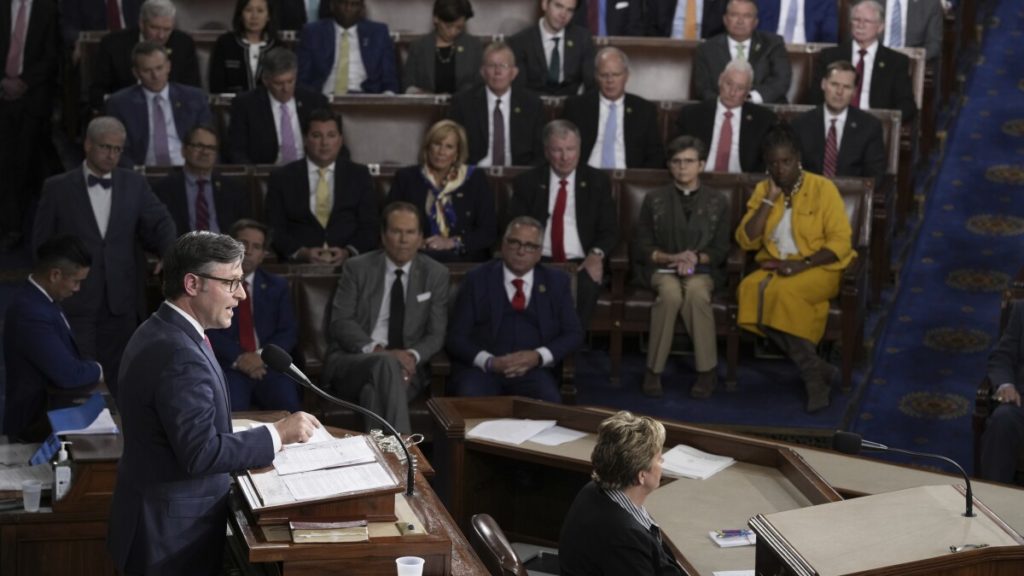
House Speaker-elect Rep. Mike Johnson, R-La., addresses members of Congress at the Capitol in Washington, Wednesday, Oct. 25, 2023. Republicans eagerly elected Johnson as House speaker on Wednesday, elevating a deeply conservative but lesser-known leader to the seat of U.S. power and ending for now the political chaos in their majority. (AP Photo/J. Scott Applewhite)
Introduction
In May 2021, a new wave of conflict erupted in the long-standing Israeli-Palestinian conflict as violence escalated between Israel and Hamas. During this period, the U.S. House of Representatives passed a resolution expressing its support for Israel’s right to defend itself. However, the vote was not unanimous, and 16 lawmakers abstained or voted against it. This article will explore the reasons behind their decisions and the implications of such actions.
The House Resolution
The House Resolution in question, H.Res. 398, expressed “the sense of the House of Representatives regarding the recent conflict between Israel and Hamas.” It voiced strong support for Israel’s right to self-defense against rocket attacks and condemned Hamas’s firing of rockets into Israel.
Lawmakers Who Abstained or Voted Against
Sixteen lawmakers either abstained or voted against the resolution. They included both Democrats and Republicans, and their decisions were met with mixed reactions.
- Alexandria Ocasio-Cortez (D-NY): Ocasio-Cortez has been an outspoken critic of Israel’s policies toward Palestinians. She stated that she abstained due to concerns over the wording of the resolution and the need for a more balanced approach.
- Ilhan Omar (D-MN): Another vocal critic of Israel, Omar voted “present.” She argued that the resolution did not address the root causes of the conflict and was not comprehensive enough.
- Rashida Tlaib (D-MI): Tlaib, of Palestinian descent, voted against the resolution. She criticized it for not acknowledging Palestinian suffering and called for a more equitable solution.
- Cori Bush (D-MO): Bush abstained, expressing concerns about the resolution’s wording and the broader Israeli-Palestinian conflict.
- Ayanna Pressley (D-MA): Pressley abstained due to concerns about the resolution’s lack of emphasis on a two-state solution.
- André Carson (D-IN): Carson abstained, emphasizing the need for a more comprehensive approach to the Israeli-Palestinian conflict.
- Earl Blumenauer (D-OR): Blumenauer abstained, echoing concerns about the resolution’s one-sidedness.
- André Carson (D-IN): Carson abstained, calling for a more balanced approach in addressing the Israeli-Palestinian conflict.
- Chuy Garcia (D-IL): Garcia abstained, expressing concerns about the resolution’s wording and approach.
- Raúl M. Grijalva (D-AZ): Grijalva voted “present,” emphasizing the need for a more comprehensive and balanced resolution.
- Hank Johnson (D-GA): Johnson abstained, highlighting concerns about the resolution’s one-sided nature.
- Mark Pocan (D-WI): Pocan abstained, emphasizing the need for a more comprehensive and equitable approach to the conflict.
- Betty McCollum (D-MN): McCollum abstained, calling for a more balanced and thoughtful resolution.
- André Carson (D-IN): Carson abstained, reiterating concerns about the resolution’s lack of balance.
- Pramila Jayapal (D-WA): Jayapal abstained, stating that she wanted to see a more comprehensive approach to the conflict.
- Ayanna Pressley (D-MA): Pressley abstained, emphasizing the need for a more balanced and comprehensive resolution.
Implications of their Decisions
The decisions of these 16 lawmakers reflected a range of concerns about the resolution’s wording, its one-sided nature, and the broader Israeli-Palestinian conflict. Their abstentions and votes against the resolution indicate the complexity of the issue and the diversity of opinions within Congress.
Supporters of Israel argue that the resolution affirmed Israel’s right to self-defense and condemned terrorist attacks. Critics, on the other hand, expressed concerns about the resolution’s focus and called for a more comprehensive approach that addresses the root causes of the conflict.
Conclusion
The House resolution supporting Israel’s right to self-defense during the conflict with Hamas did not receive unanimous support. The decisions of the 16 lawmakers who abstained or voted against it reflect differing viewpoints on the Israeli-Palestinian conflict and the need for a more balanced and comprehensive approach to resolving this ongoing crisis. The issue remains a subject of debate and discussion within the U.S. Congress and the broader international community.




